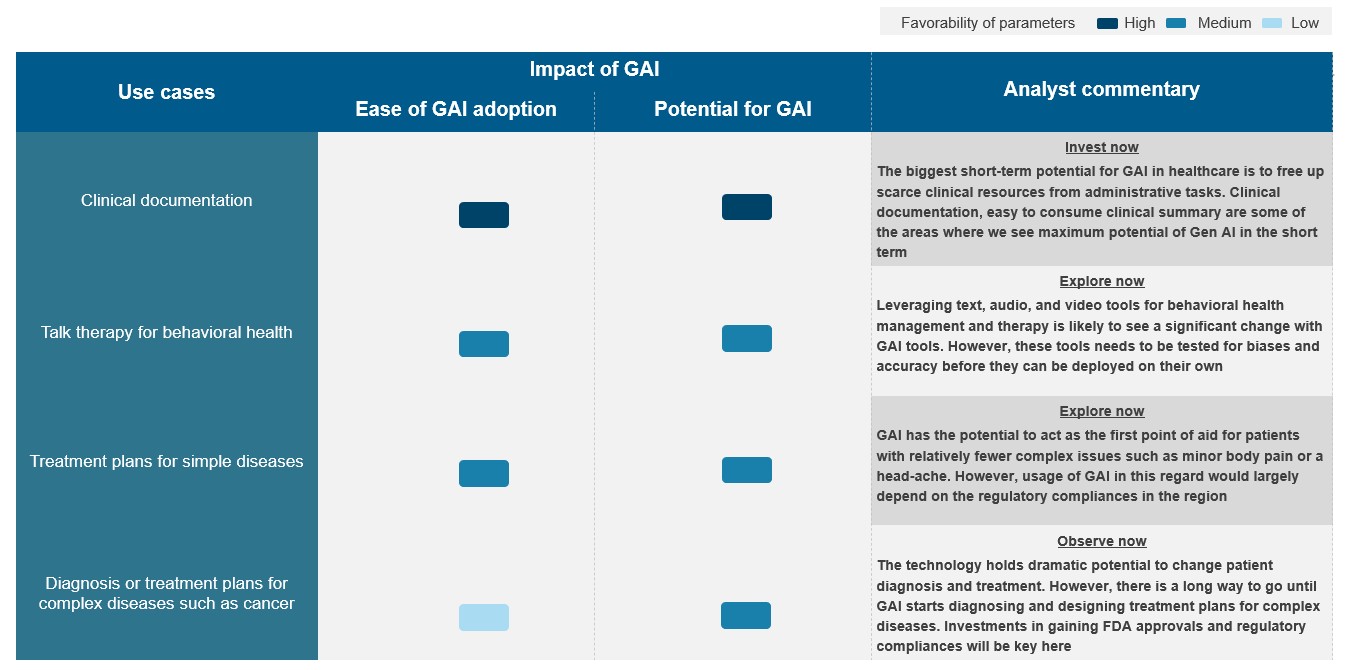Blog
Generative AI in Healthcare – A Game Changer or Another Fad?

Generative AI (GAI) has disrupted numerous industries, and the healthcare industry is eager to join in and explore the applications of GAI in healthcare research. However, the healthcare sector must be cautious due to the potential risks. Read on to learn more about Generative AI in healthcare, including adoption, usage, and risks.Reach out to us directly
for questions or further details.
Generative AI, an advanced technology that employs deep learning models, can create images, videos, text, codes, simulations, and other high-quality content by responding to given prompts within seconds.
While GAI has been shaking up almost every industry with its easy-to-use interface and instant responses, the healthcare sector is typically slower to adopt new technology, and the risks of inappropriately deploying the technology are huge.
Nevertheless, technology giants and healthcare startups are racing to test the potential for large language models (LLMs) and GAI tools in healthcare research. Understanding the adoption, usage, and potential risks of GAI in the healthcare setting is crucial.
With its vast applications, it is important to carefully select the use cases that can positively impact patients with minimal regulatory, compliance, cost, and health risks. Let’s explore this further.
By using the below framework, healthcare organizations can prioritize use cases for observation, exploration, and future investment:


Based on our analysis, GAI offers the greatest immediate potential in the area of clinical documentation. The technology can be used to free scarce clinical resources from time-consuming administrative tasks, allowing them to instead focus on delivering quality care to patients. For example, simplifying clinical documents and creating easy-to-review clinical patient summaries are some areas where GAI can have the greatest short-term impact in healthcare.
Looking beyond these basic applications, healthcare stakeholders need to cautiously consider using GAI for diagnosing patients or directly providing medical care. The technology’s tendency to sometimes invent a response when it lacks sufficient information makes it too risky for care delivery. Significant long-term investments will be needed before GAI can be used for delivering patient care.
Will Generative AI in healthcare lead to job loss?
GAI is expected to considerably alleviate the administrative burden of healthcare professionals. The nature of jobs will shift and healthcare professionals will have to adapt as demand grows for GAI. Certain healthcare professions such as medical transcriptionists, medical record keepers, medical coders, call center executives, and home healthcare executives will need to upskill as GAI automates some manual processes.
The other big question in everyone’s mind is whether GAI will completely replace physicians. This is unlikely to happen anytime soon. GAI should be viewed as a tool to augment healthcare professionals’ capabilities and not replace them entirely. Physicians, surgeons, radiologists, and nutritionists will leverage GAI to enhance care delivery.
Challenges to future adoption
Generative AI in healthcare is a disruptive opportunity that both excites and concerns healthcare professionals. While it offers significant potential, the industry needs to overcome obstacles to commercial adoption.
Some of the risks include:
- Ethical concerns and biases – Healthcare professionals must be wary of the ethical concerns and limitations related to using sensitive member/patient information. Moreover, limitations of datasets also can lead to biases in results or outcomes suggested by GAI
- Training data limitations – Generative AI models require high-quality training data to improve the accuracy of output, which can be difficult to source. The model’s efficiency also depends on the breadth of training data, which can be both time-consuming and expensive to label
- Integration issues – Integrating GAI into existing healthcare systems and workflows can be challenging, especially with legacy systems that are not designed to work with AI
- High costs – The technology costs of building and deploying GAI models can be expensive
Adopting Generative AI in healthcare can be a game changer. While it offers many potential benefits, the industry needs to fully understand the associated risks of GAI before implementing use cases and adopting the technology at scale.
To discuss the future of Generative AI in healthcare, contact Kaushik Sundar, [email protected], or Priya Sahni, [email protected].
Continue learning about the healthcare industry in our webinar, How Technology Can Help Healthcare Overcome the $30 Billion RCM Spend.